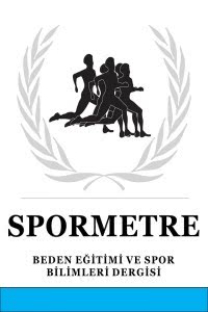American Futbolu Oyuncularında Hedef Yönelimi ve Algılanan Güdüsel İklim
Bu çalışmanın amacı, Amerikan futbolu oyuncularının hedef yönelimleri ve güdüsel iklim düzeylerini belirlemek ve oynanan mevkiye göre karşılaştırmaktır. Çalışmaya Ankara’da Amerikan futbol takımı olan üç üniversiteden toplam 102 amerikan futbolcusu (Xyaş 21.21± 1.91; 52 defans ve 50 hücum oyuncusu) gönüllü olarak katılmıştır. Sporcuların hedef yönelimleri “Sporda Görev ve Ego Yönelim Ölçeği”, güdüsel iklimleri “Sporda Algılanan Güdüsel İklim Ölçeği” ile belirlenmiştir. Elde edilen verilerin analizinde betimsel istatistik ve bağımsız örneklerde t test kullanılmıştır. Analizler, Amerikan futbolu oyuncularının görev yönelimli hedef profiline sahip olduklarını ve algılanan güdüsel iklimin ustalık iklimi olduğunu ortaya koymuştur. Elde edilen sonuçlar hücum takımında oynayan oyuncuların performans iklimi değerleri ile defans takımında oynayan oyuncuların performans iklimi değerleri arasında anlamlı fark olduğunu ortaya koymuştur (t = -2.77; p0.05), ego yönelimi (t= - 1.25; p>0.05) ve ustalık iklimi (t= -0.24;p>0.05) değerleri ile defans takımında oynayan oyuncuların değerleri arasında anlamlı fark bulunmamıştır. Sonuç olarak; Amerikan futbol oyuncularının görev yönelimli oldukları ve algılanan güdüsel iklimin takımda üstlenen rollere göre farklılaştığı söylenebilir.
A Study of Goal Orientation and Motivational Climate in American Football
The purpose of this study was to determine motivational goal orientation and perceived motivational cliamte of American football players and compare these two variables with regard to playing position in team. 102 American football players from three universities team in Ankara voluntarily partcipated in this study. “The Task and Ego Orientation in Sport Questionnaire” and “The Perceived Motivation Climate Questionnaire” were used to assess the motivational goal orientation and perceived motivational climate of American football players. Descriptive statistic and independent t-test were used to analyse data. Analysis revealed that American football players were more task oriented and perceived motivational climate as mastery oriented. The obtained results indicated a significant differences in perceived performance climate scores between offence and defense players (t = -2.77;p<0.05). On the other hand, no significant differences were found in task orientation (t= -0.76; p>0.05), ego orientation (t= -1.25; p>0.05) and mastery climate (t= -0.24; p>0.05), scores between defence and offence players. It can be concluded that, American football players are task oriented and perceived motivational cliamte in American football is changed with regard to roles of players in team.
___
- 1. Tiryaki, Ş. Spor Psikolojisi: Kavramlar, Kuramlar ve Uygulama. Eylül Yayınevi: Ankara, 2000.
- 2. Weinberg, R. S. ve Gould, D. Foundations of sport and exercise psychology. Champaign, IL: Human Kinetics, 1995.
- 3. Nicholls, J. G. “The general and the specific in the development and expression of achievement motivation”. In G. C. Roberts (Ed.), Motivation in sport and exercise (pp. 31-56). Champaign, IL: Human Kinetics, 1992.
- 4. Duda, J. L. Goals: A social cognitive approach to the study of achievement motivation in sport: In R. N. Singer, M. Murphy, ve L. K. Tennent (Eds.), Handbook on research on sport psychology (pp. 421-436). NewYoork: Macmillan, 1993
- 5. Papaioannou, A. “ Development of questionnaire to measure achievement orientation in physical education”. Research Quarterly for Exercise and Sport, 65, pp. 11-20, 1994.
- 6. Roberts, G. C. ve Ommundsen, Y. “ Effect of goal orientation on achievement beliefs, cognition and strategies in team sport”, Scandinavian Journal of Medicine and Sport, 6, pp. 46-56, 1996.
- 7. Duda, J. L. “Goal persepectives, participation and persistence in sport”, International Journal of Sport Psychology, 20, 42-56, 1989.
- 8. Duda, J. L. ve Whitehead, J. “ Measurement of goal perspectives in the physical domain”, In J. L. Duda (Ed.). Advances in sport and exercise psychology measurement (pp. 21-48) Morgantown: Fitness Information Technology.
- 9. Toros, T. “Elit ve elit olmayan basketbolcularda hedef yönelimi, güdüsel iklim ve hedeflerin özgünlük, güçlük derecesi özelliklerinin yaşam doyumuna etkisi”. Yayınlanmamış Yüksek Lisans Tezi: Mersin, 2001.
- 10. Toros, T. Ve Koruç, Z. “Hedef yönelimleri ve algılanan motivasyonel iklim arasındaki ilişki: Liseli erkek voleybolcular üzerine bir çalışma”, 10. ICHBER-SD Avrupa Kongresi & SBD 8. Uluslararası Spor Bilimleri Kongresi, Antalya, Türkiye, 2004.
- 11. Gano-Overway, L. A., Guivernau, M., Magyar, T. M., Waldron, J. J., ve Ewing, M. E. “Achievement goal perspectives, perceptions of the motivational climate, and sportspersonship: Individual and team effects” Psychology of Sport and Exercise, 6, 2, pp.215-232, 2005.
- 12. Hodge, K., ve Petlichkoff, L. “Goal profiles in sport motivation: A cluster analysis”., Journal of Sport and Exercise Psychology, 22, pp.256-272, 2000.
- 13. Whitehead, J. Andree, K. V., Lee, M. J. “Achievement perspectives and perceived ability: How far do interactions generalize in youth sport?”, Psychology of Sport and Exercise, 5, 3, pp.291-317, 2004.
- 14. Fry, M. D. Ve Fry, A. C. “ Goal perspectives and motivational responses of elite junior weightlifters”. Journal of Strength and Conditioning, 13, 4, pp. 311-317, 1999.
- 15. Toros, T. “ Sporda Görev ve Ego Yönelim Ölçeği-SGEYÖ’nin Türk sporcuları için güvenirlik ve geçerlik çalışması” Spor Bilimleri Dergisi, 15, 3, pp.155-166, 2004.
- 16. Walling, M. D., Duda, J. L., ve Chi, L. “ The perceived motivational climate in sport questionnaire: Construct and predictive validity”, Journal of Sport and Exercise Psychology, 15, pp. 172-183, 1993.
- ISSN: 1304-284X
- Yayın Aralığı: Yılda 4 Sayı
- Başlangıç: 2003
- Yayıncı: -
Sayıdaki Diğer Makaleler
Burcu TÜZEN, RECEP SÜRHAT MÜNİROĞLU, Kerem TANILKAN
Burcu TÜZEN, Sürhat MÜNİROĞLU, Kerem TANILKAN
FİTNES UZMANLARININ BEDENLERİNE YÖNELİK ALGILARI
Atahan ALTINTAŞ, F. Hülya AŞÇI
American Futbolu Oyuncularında Hedef Yönelimi ve Algılanan Güdüsel İklim
Bayrak ARIBURUN, F. Hülya AŞÇI
16-18 Yaş Grubu Futbolcularda Masajın Esneklik Üzerine Etkisi
Mehmet KOÇAK, YAĞMUR AKKOYUNLU, HALİL TAŞKIN
AMERİKAN FUTBOLU OYUNCULARINDA HEDEF YÖNELİMİ VE ALGILANAN GÜDÜSEL İKLİM
Bayrak ARIBURUN, F. Hülya AŞÇI
Fitnes Uzmanlarının Bedenlerine Yönelik Algıları
ATAHAN ALTINTAŞ, F. Hülya AŞÇI
16 – 18 YAŞ GRUBU FUTBOLCULARDA MASAJIN ESNEKLİK ÜZERİNE ETKİSİ
